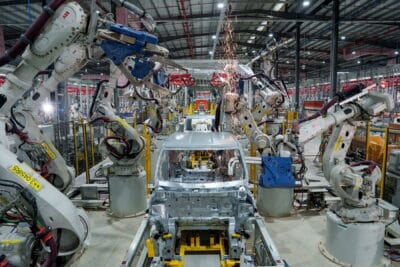EU Parliament votes to end combustion vehicle sales in 2035
The EU Parliament has cleared the way for the phasing out of internal combustion engines in new passenger cars and light commercial vehicles from 2035 as part of the EU climate package “Fit for 55”. The Parliament’s position for the negotiations with the EU Member States is thus clear.
The result of the vote: 339 votes in favour, 249 against and 24 abstentions. With the adopted text, which represents Parliament’s negotiating position vis-à-vis the Member States, MEPs support the corresponding proposal of the EU Commission. Car manufacturers must reduce their average fleet emissions by 15 per cent by 2025 compared to 2021, by 55 per cent by 2030 and by 100 per cent by 2035. There is no backdoor for synthetic fuels.
If these resolutions were implemented, it would de facto mean the end of sales of new cars and light commercial vehicles with combustion engines from 2035. So the goal is to switch to electromobility. However, there is no commitment to battery or fuel cell – the decisive factor is that the cars themselves do not emit any climate-damaging greenhouse gases during operation. This means that plug-in hybrids would also be affected by the regulation.
However, the EU Parliament’s vote does not yet mean that the ban on internal combustion engines is a done deal. In addition to the EU Parliament, the governments of the member states must also give their consent. The EU states want to define a common position by the end of June. The German government supports the planned phase-out of internal combustion vehicles in 2035.
If the EU states also agree, the regulations would only apply to new registrations, as mentioned above. The existing fleet would not be affected. As of 1 January 2022, 31.0 million petrol cars and 14.8 million diesel cars were registered in Germany alone – and 618,000 battery electric cars.
VDA criticises early decision
“An ambitious revision of CO2-standards is a crucial part of reaching our climate targets,” said Dutch MEP Jan Huitema, who had introduced the draft. “With these standards, we are creating clarity for the car industry and can stimulate innovation and investments for car manufacturers.”
Reactions to the decision are divided. Already in the run-up to the vote, VDA President Hildegard Müller let it be known that she considered the setting of a target for 2035 “in view of unclear developments with regard to the framework conditions” too early – it would be better to decide “on the basis of a detailed review in 2028”.
The NGO Transport & Environment, on the other hand, welcomed the decision. “The deadline means the last fossil fuel cars will be sold by 2035, giving us a fighting chance of averting runaway climate change,” said Alex Keynes, clean vehicles manager at T&E. “Phasing out combustion engines is also a historic opportunity to help end our oil dependence and make us safer from despots. And it gives the certainty the car industry needs to ramp up production of electric vehicles, which will drive down prices for drivers.”
Keynes also praised the fact that EU parliamentarians had opposed the imputation of synthetic fuels. “Allowing synthetic fuels in cars would be an expensive and wasteful diversion from the mammoth task of cleaning up transport,” Keynes said. “Battery electric vehicles are ready today and are a cleaner, cheaper, more efficient way to decarbonise.”
In Wednesday’s session, however, the EU Parliament had rejected large parts of the climate package. Among them is the planned extension of emissions trading with CO₂ certificates to transport and buildings. The different camps disagreed on whether the current emissions trading system should be relaxed or tightened. After the vote, the different factions blamed each other for the failure. Now the environment committee has to revise the law and find a compromise that can win a majority.





0 Comments